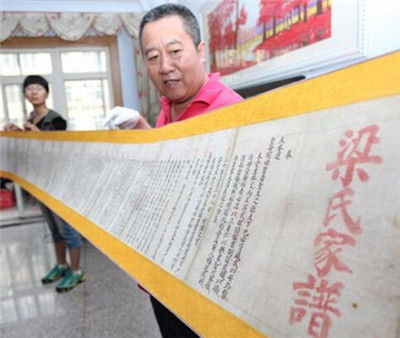(单词翻译:单击)
When Adam Liu decided to research his family roots, he had no problem tracing his grandmother’s family back to Ireland and England from his home computer in Sydney, Australia. But he soon hit a wall with the great-grandfather who left China to seek his fortune in Singapore in the 1890s.
生活在澳大利亚悉尼的刘先生(Adam Liu,刘为音译)想要探寻家族根源,他毫不费劲地用家中的电脑搜索到,祖母的家族来自爱尔兰和英格兰。但在寻找有关曾祖父的信息时,他一无所获。他的曾祖父在19世纪90年代离开中国去了新加坡。

He decided to hire a tiny start-up called My China Roots based near Beijing’s Confucius Temple. It offers bespoke ancestry searches for overseas Chinese seeking insight into where their forefathers came from, and what drove them to leave.
刘先生决定请一家名为“中华家脉”(My China Roots)的小公司来帮他寻根。“中华家脉”是一家规模很小的初创公司,办公地址在北京孔庙附近,为海外华人提供定制寻根服务,帮助他们探寻自己的祖先来自哪里、以及当初离开中国的原因。
“You want to have a real, tangible connection to where you stand in the context of history,” says Mr Liu, who first became curious about his roots when he was assigned to draw a family tree in school.
刘先生说:“人会希望切实地触摸自己与历史的联系。”他第一次对自己的家族根源产生兴趣,是在有一次学校布置作业、让他们画下自己的族谱时。
The Chinese diaspora numbers 50m whose ancestors settled the trading posts of southeast Asia over the past 200 years but also voyaged to places further afield, such as Manchester, home to Britain’s largest Chinese community, and the crowded streets of New York’s Lower East Side.
全世界有5000万华侨华人。在过去200年里,他们的祖先不仅在东南亚各贸易城市定居下来,还有些走得更远,来到了曼彻斯特(那里有英国最大的中国城)和纽约下东区的拥挤街区。
“The overwhelming majority left for non-pleasant reasons. Whether poverty or political it was never pleasant,” says Huihan Lie, My China Roots founder and the descendent of Dutch-speaking Indonesian Chinese who moved to the Netherlands after Indonesia’s independence.
“中华家脉”创始人李伟汉(Huihan Lie)的祖辈是印尼华人,说荷兰语,在印尼独立后移民到了荷兰。李伟汉说:“大多数华人都是迫不得已才离开的。要么是因为贫穷,要么是因为政治方面的原因,总之回想起来绝不让人愉快。”
Ancestry.com reported revenues of $540m last year selling services to North Americans, Australians and others researching their roots. Businesses focusing on European ancestry are basically data providers, offering electronic searches of material from Ellis Island or centuries of marriage, death and census records.
家谱网(Ancestry.com)去年报告营收5.4亿美元,其业务是向北美、澳大利亚和其他地区的华人提供寻根服务。在欧洲提供寻根服务的公司主要是数据提供商,提供从埃利斯岛(Ellis Island,指美国移民局——译者注)搜索的资料,以及多个世纪的婚姻、死亡和人口普查资料。
Chinese ancestry research, by contrast, is “hard to scale up”, Mr Lie discovered.
李伟汉发现,相形之下,中国的寻根服务则“很难做大”。
Chinese families record their births and deaths in the jia pu, or ancestral book, which can stretch across centuries. Most are maintained by the clan or temple in the ancestral village, not by any public authority, which makes it hard to compile digital databases. Many vanished during a century of war and attacks by early communists, including the fanatical Red Guards.
中国人在家谱里记录族人的出生和死亡,记录的时间跨度可达数个世纪。家谱大多由古老村庄中的宗祠祖庙、而不是公共机关管理,因此很难编制数字化数据库。许多家谱在一个世纪的战争中遗失了,还有许多被狂热的红卫兵等初期共产主义者毁掉了。
“There’s a lot of personal history that’s so easily destroyed,” says Mr Lie, who tries to make his clients’ ancestors “come alive” with descriptions of their surroundings and the political context of their lives.
李伟汉说:“很多个人历史很容易就被毁灭了。”他试图通过描述当时的环境和他们生活的政治背景,还原客户祖先的生前情景。
Some online ancestry websites offer advice for overseas Chinese – for instance, by explaining the limited online databases of jia pu and other records – but few sell search services. And those records are inaccessible for people such as Mr Liu who do not read Chinese.
有一些在线寻根网站为海外华人提供建议,比如对网上有限的家谱资料和其他记录进行解释,但很少有网站会代客户进行寻找。像刘先生这样的华人也不会中文,因此也看不懂那些记录。
The task is complicated by the short list of Chinese family names (the top 100 account for about 85 per cent of all Chinese, compared with about 25,000 relatively common British surnames) and the unwillingness of many emigrants to confide in their assimilated children.
中国人的姓相对较少(100个大姓就占了所有中国人的85%,而英国人有2.5万个常用姓),许多华人移民也不愿把家世告诉已经被异乡同化了的子女,这两点让寻根变得更加困难。
Most jia pu fail to record the full names of wives or daughters, in effect limiting most searches to the father’s line.
大多数家谱未记录妻子或女儿的全名,导致大多数搜索只能局限于父系。
My China Roots’s small team of researchers act like detectives, identifying villages through local historical associations and interviewing elderly residents to determine how the family has fared since the client’s ancestor left home. When the team visited Mr Liu’s ancestral temple in inland Jiangxi province, they discovered a lineage that stretched back 3,000 years.
“中华家脉”的研究员人数很少,他们的工作方式好像侦探——通过地方史志机构找到祖村,探访年长居民、打探客户祖先离乡后整个家族的变迁。研究员们造访刘先生老家位于江西省的宗祠后发现,刘氏家族的谱系可追溯至3000年前。
To expand, Mr Lie is training a network of promising young provincial researchers.
为扩大业务,李伟汉正在培养一批年轻有前途的乡土研究员。
It is a race against time. Mr Lie traced his mother’s roots to a village near Zhangzhou, the silk-trading city in China’s southern Fujian province that they left seven generations ago. But like much of China’s heritage, the 500-year-old clan temple that protected the family records during centuries of war and revolution is about to fall victim to an even more implacable force – economic development and the wreckers’ ball.
这是一场与时间的赛跑。李伟汉追溯到,他母亲的祖先来自福建丝绸贸易古城漳州附近的一个村庄,他们在七代以前离开家乡。但如中国大部分传统事物的命运一样,那座已有500年历史、在几个世纪的战火和革命中保护了家族记录的宗祠,即将被一股更加难以阻挡的力量摧毁,那就是经济发展和拆迁队的破碎机。


